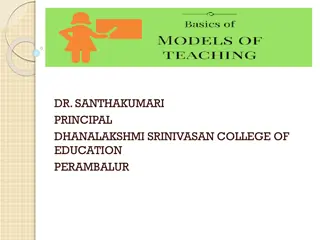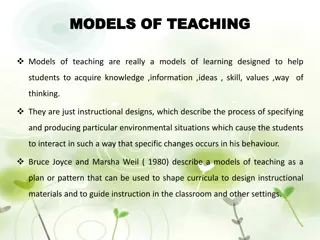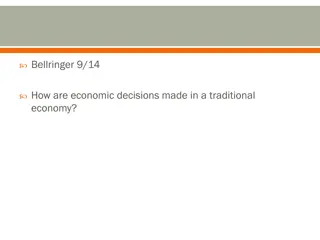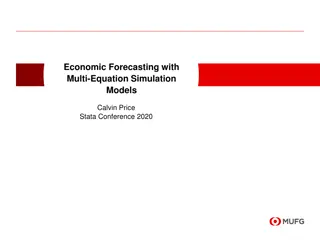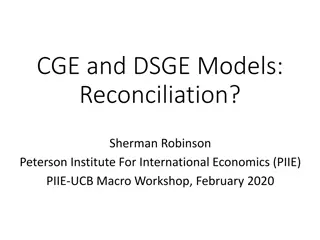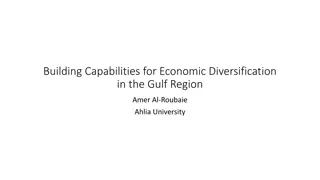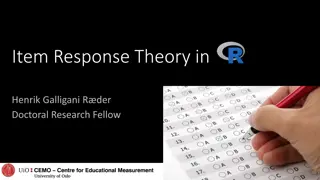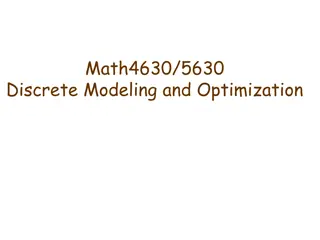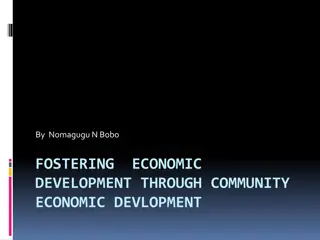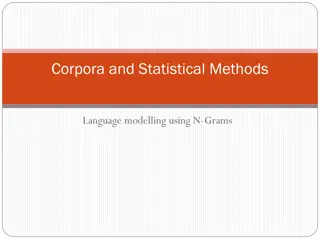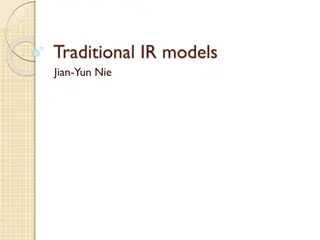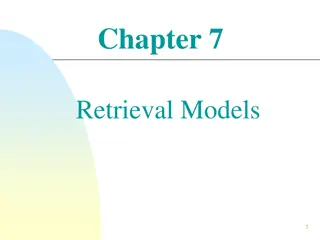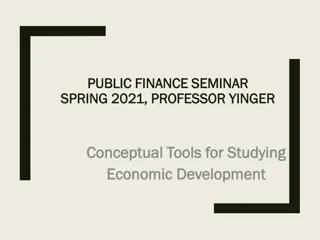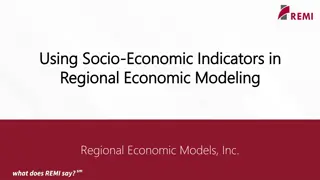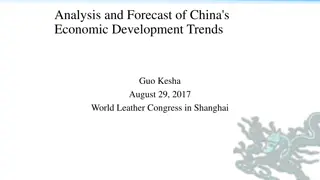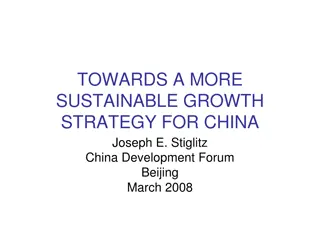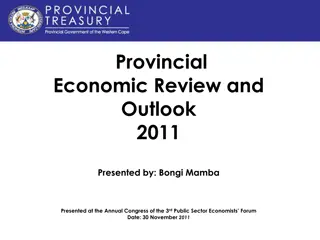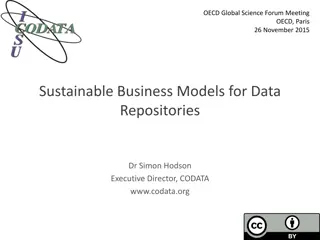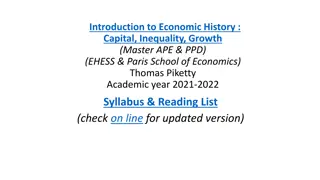Global Climate Models
Scientists simulate the climate system and project future scenarios by observing, measuring, and applying knowledge to computer models. These models represent Earth's surface and atmosphere using mathematical equations, which are converted to computer code. Supercomputers solve these equations to pr
3 views • 15 slides
System Models in Software Engineering: A Comprehensive Overview
System models play a crucial role in software engineering, aiding in understanding system functionality and communicating with customers. They include context models, behavioural models, data models, object models, and more, each offering unique perspectives on the system. Different types of system
3 views • 33 slides
Understanding Sustainable Business Models in the Context of Open Data and Socio-Economic Perspectives
Explore the intricate interplay between sustainable business models, open data practices, and socio-economic perspectives presented by Andrew Coote. Delve into the impacts, assessment methods, and the importance of data accessibility in decision-making. Gain insights into the FAIR principles and the
1 views • 16 slides
2023/24 Annual Performance Plan Presentation for Small Business Development Department
The presentation outlines the 2023/24 Annual Performance Plan of the Department of Small Business Development, covering situational analysis, global economic outlook, performance priorities, game-changers program, alignment with economic recovery plans, institutional program performance, key risks a
27 views • 59 slides
Understanding Input-Output Models in Economics
Input-Output models, pioneered by Wassily Leontief, depict inter-industry relationships within an economy. These models analyze the dependencies between different sectors and have been utilized for studying agricultural production distribution, economic development planning, and impact analysis of i
8 views • 7 slides
Understanding Models of Teaching in Education
Exploring different models of teaching, such as Carroll's model, Proctor's model, and others, that guide educational activities and environments. These models specify learning outcomes, environmental conditions, performance criteria, and more to shape effective teaching practices. Functions of teach
2 views • 20 slides
Understanding Models of Teaching for Effective Learning
Models of teaching serve as instructional designs to facilitate students in acquiring knowledge, skills, and values by creating specific learning environments. Bruce Joyce and Marsha Weil classified teaching models into four families: Information Processing Models, Personal Models, Social Interactio
1 views • 28 slides
U.S. Virgin Islands Economic Development Authority Webinar: Small Business COVID-19 Resources
The U.S. Virgin Islands Economic Development Authority held a webinar focused on providing resources and assistance for small businesses impacted by COVID-19. The agenda covered the overall economic impact, reliable resources, SBA Economic Injury Disaster Loan (EIDL), and the tourism industry. Speak
0 views • 13 slides
Economic Systems in the United Kingdom, Germany, and Russia
Economic decisions in traditional economies are based on customs and beliefs. The United Kingdom has a mixed market economy with a focus on service industries, while Germany's economy is export-based. Russia's economy leans towards a command system. By comparing these economic systems, one can see h
0 views • 11 slides
Understanding Economic Forecasting with Simulation Models
Explore the concept of economic forecasting using multi-equation simulation models, focusing on producing data that follows estimated equations rather than estimating model parameters. Learn about endogenous and exogenous variables, the importance of assumptions in forecasting, and the use of simula
0 views • 38 slides
Significance of Models in Agricultural Geography
Models play a crucial role in various disciplines, including agricultural geography, by offering a simplified and hypothetical representation of complex phenomena. When used correctly, models help in understanding reality and empirical investigations, but misuse can lead to dangerous outcomes. Longm
0 views • 8 slides
Understanding Key Concepts in Economic Geography
Economic Geography is a sub-discipline that utilizes a geographical approach to analyze the spatial distribution of economic activities at various scales. It focuses on the location of economic activities and their relationship with the environment, encompassing primary, secondary, and tertiary sect
1 views • 20 slides
Understanding CGE and DSGE Models: A Comparative Analysis
Explore the similarities between Computable General Equilibrium (CGE) models and Dynamic Stochastic General Equilibrium (DSGE) models, their equilibrium concepts, and the use of descriptive equilibria in empirical modeling. Learn how CGE and DSGE models simulate the operation of commodity and factor
4 views • 15 slides
Enhancing Economic Diversification in the Gulf Region
Economic diversification in the Gulf region is crucial for sustainable growth and development. Productive capacities, defined as the resources and capabilities enabling countries to produce goods and services, play a key role. Economic diversification involves shifting towards a varied structure of
0 views • 13 slides
Enhancing Information Retrieval with Augmented Generation Models
Augmented generation models, such as REALM and RAG, integrate retrieval and generation tasks to improve information retrieval processes. These models leverage background knowledge and language models to enhance recall and candidate generation. REALM focuses on concatenation and retrieval operations,
1 views • 9 slides
Understanding Item Response Theory in Measurement Models
Item Response Theory (IRT) is a statistical measurement model used to describe the relationship between responses on a given item and the underlying trait being measured. It allows for indirectly measuring unobservable variables using indicators and provides advantages such as independent ability es
2 views • 32 slides
Understanding Discrete Optimization in Mathematical Modeling
Discrete Optimization is a field of applied mathematics that uses techniques from combinatorics, graph theory, linear programming, and algorithms to solve optimization problems over discrete structures. This involves creating mathematical models, defining objective functions, decision variables, and
0 views • 12 slides
Fostering Economic Development Through Community Economic Development
Community Economic Development (CED) involves local actions to create economic opportunities improving social conditions, especially for the disadvantaged. It recognizes the interdependence of economic, environmental, and social challenges, emphasizing solutions rooted in local knowledge. The ultima
1 views • 30 slides
Observational Constraints on Viable f(R) Gravity Models Analysis
Investigating f(R) gravity models by extending the Einstein-Hilbert action with an arbitrary function f(R). Conditions for viable models include positive gravitational constants, stable cosmological perturbations, asymptotic behavior towards the ΛCDM model, stability of late-time de Sitter point, a
1 views • 12 slides
Understanding Wireless Propagation Models: Challenges and Applications
Wireless propagation models play a crucial role in characterizing the wireless channel and understanding how signals are affected by environmental conditions. This article explores the different propagation mechanisms like reflection, diffraction, and scattering, along with the challenges and applic
1 views • 14 slides
Models for On-line Control of Polymerization Processes: A Thesis Presentation
This presentation delves into developing models for on-line control of polymerization processes, focusing on reactors for similar systems. The work aims to extend existing knowledge on semi-batch emulsion copolymerization models, with a goal of formulating models for tubular reactors. Strategies, ba
0 views • 16 slides
Understanding N-Gram Models in Language Modelling
N-gram models play a crucial role in language modelling by predicting the next word in a sequence based on the probability of previous words. This technology is used in various applications such as word prediction, speech recognition, and spelling correction. By analyzing history and probabilities,
0 views • 101 slides
Understanding Information Retrieval Models and Processes
Delve into the world of information retrieval models with a focus on traditional approaches, main processes like indexing and retrieval, cases of one-term and multi-term queries, and the evolution of IR models from boolean to probabilistic and vector space models. Explore the concept of IR models, r
0 views • 65 slides
Enhancing Economic Statistics in Asia-Pacific Region
The Regional Programme on Economic Statistics aims to improve economic statistics in the Asia-Pacific region by enhancing capacity and coordination among National Statistical Offices (NSOs) and other stakeholders. The programme focuses on implementing the Core Set of Economic Statistics to facilitat
0 views • 11 slides
Understanding Cross-Classified Models in Multilevel Modelling
Cross-classified models in multilevel modelling involve non-hierarchical data structures where entities are classified within multiple categories. These models extend traditional nested multilevel models by accounting for complex relationships among data levels. Professor William Browne from the Uni
0 views • 13 slides
Understanding General Equilibrium Models and Social Accounting Matrices
General Equilibrium Models (CGE) and Social Accounting Matrices (SAM) provide a comprehensive framework for analyzing economies and policies. This analysis delves into how CGE models help simulate various economic scenarios and their link to SAM, which serves as a key data input for the models. The
0 views • 50 slides
Understanding Economic Models: Assumptions, Deductive Reasoning, and Logical Fallacies
Economic models utilize deductive reasoning to simplify real-world economic relationships. Assumptions vs. implications are key components, where assumptions reflect reality or are simplifying. This process helps identify conditions for specific outcomes to occur and distinguishes between consequent
1 views • 17 slides
Understanding Retrieval Models in Information Retrieval
Retrieval models play a crucial role in defining the search process, with various assumptions and ranking algorithms. Relevance, a complex concept, is central to these models, though subject to disagreement. An overview of different retrieval models like Boolean, Vector Space, and Probabilistic Mode
0 views • 56 slides
Overview of Economic Policy: From Mercantilism to Present-Day Practices
Explore the concept of economic policy and its importance in achieving economic objectives. Delve into the historical debate on state intervention in the economy and major schools of economic theory like Mercantilism. Understand the emergence of economic policies through economic, political, scienti
0 views • 105 slides
Understanding Economic Shutdown Strategies During a Pandemic
This chapter delves into the economic implications of pandemic shutdowns, exploring topics such as the shutdown interval, flattening the epidemic curve, non-pharmaceutical interventions, and the tradeoff between economic health and public health. It analyzes the impact on labor markets, income loss,
0 views • 34 slides
Understanding Scientific Models and Their Applications
Explore the world of scientific models through this informative content covering physical, mathematical, and conceptual models. Discover why models are used in science, their types, and potential limitations. Delve into the importance of utilizing models to comprehend complex concepts effectively.
0 views • 21 slides
Understanding Economic Development: Tools and Models for Analysis
Exploring conceptual tools for studying economic development, this seminar delves into key macroeconomic models such as Keynesian, export-base, and input-output models. The simplicity and implications of a Keynesian model, including the role of savings, consumption, investments, and trade, are discu
0 views • 42 slides
Understanding Composite Models in Building Complex Systems
Composite models are essential in representing complex entities by combining different types of models, such as resource allocation, transport, and assembly models. Gluing these models together allows for a comprehensive representation of systems like the milk industry, where raw materials are trans
0 views • 27 slides
Analyzing Socio-Economic Indicators in Regional Economic Modeling
Analysts utilize regional macroeconomic models to assess the impact of policies on various economic factors including employment, income distribution, and workforce demographics. REMI-SEI framework focuses on understanding the distributional effects of regional economic policies to offer broad-based
0 views • 32 slides
Analysis and Forecast of China's Economic Development Trends - Guo Kesha Presentation
The presentation by Guo Kesha at the World Leather Congress in Shanghai delves into the analysis and forecast of China's economic development trends. It discusses whether a new cycle has opened for the Chinese economy, the potential for an L-type growth platform, and initial research on economic tre
0 views • 22 slides
Challenges and Strategies for Sustainable Growth in China
China has experienced significant economic growth in the past three decades, moving millions out of poverty and becoming a global economic powerhouse. However, challenges such as growing inequality, environmental strains, and the need for more sustainable growth strategies have emerged. Addressing t
0 views • 18 slides
Economic Review and Outlook 2011: Global Trends and Regional Impacts
The Provincial Economic Review and Outlook for 2011 highlighted the global economic performance and outlook, focusing on factors like GDP growth, employment trends, and socio-economic conditions in the Western Cape region. It discussed the recovery in global economic growth post-2009, with the IMF p
0 views • 29 slides
Sustainable Business Models for Data Repositories Project
This project focuses on addressing the challenge of sustainable business models for data repositories in light of increasing data volumes and stewardship requirements. Dr. Simon Hodson, Executive Director of CODATA, highlights the importance of innovative funding models and the need for a strong val
0 views • 23 slides
Introduction to Economic History: Capital, Inequality, Growth - Course Overview
This course provides a comprehensive introduction to economic history, focusing on the relationship between capital accumulation, inequality, and growth. It covers topics such as historical evolution of global distribution of wealth, property regimes, and political systems. Emphasis is placed on und
0 views • 19 slides
Community-Based Anti-Violence Strategies and Models: Insights and Challenges
Strategies and models for addressing community-based violence involve integration of key groups, including religious organizations, outreach workers, and historical considerations. US models like OJJDP, LA GRYD, Boston Ceasefire, and Chicago Cure Violence offer comprehensive approaches. The Response
0 views • 9 slides





